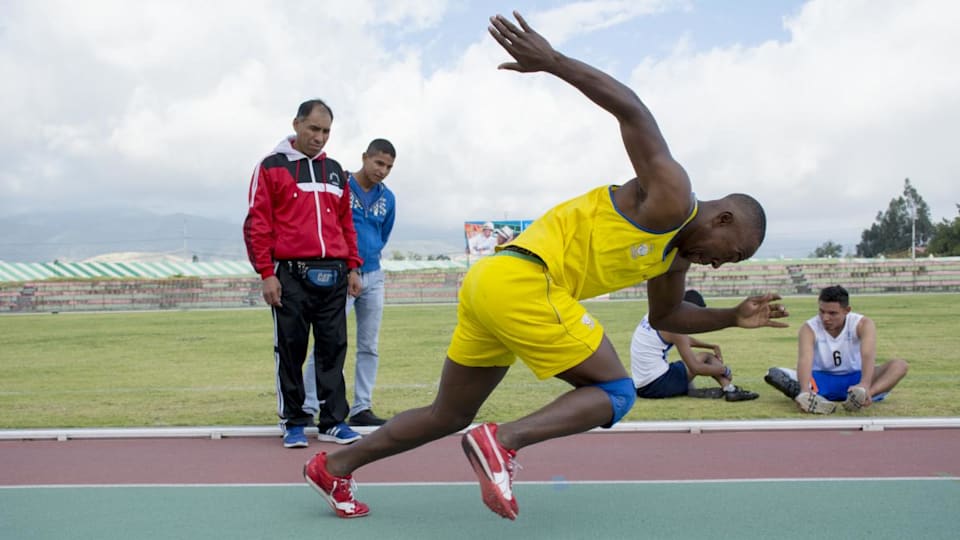‘En sus marcas, listos…Inclusión’ transforms realities in Latin America
Project implemented by Agitos Foundation uses Para sports as tool for social inclusion. It has impacted five nations, has extended to three more and there are plans to continue expanding throughout the region.

Over 400 Latin American athletes have experienced qualitative changes in their lives and sports careers since the launch of the project 'En sus marcas, listos... Inclusión' created by the Agitos Foundation, the development arm of the International Paralympic Committee (IPC).
Launched during the Rio 2016 Paralympic Games, the end goal was to promote social inclusion of people with impairments through sport and to help them generate a positive and lasting impact on the communities in which they live.
The project has been introduced in 10 communities in five nations in the Americas: Colombia, Ecuador, El Salvador, Nicaragua and Peru. These communities have had high rates of poverty and inclusion along with high percentages of people with impairments, who had no access to sport.
"The fact that there are people with intellectual disabilities who never left their homes and thanks to the project now practise sports every day and have an independent life, is invaluable," said José Cabo, who is the Agitos Foundation Programme Senior Manager and in charge of the execution of 'En sus marcas, listos...Inclusión'.
Athletics is the most practised sport in the communities impacted by 'En sus marcas, listos...Inclusión' as it can be easily implemented. People with any type of impairment can participate and, can practise anywhere from inside facilities to open spaces such as beaches or fields.
However, several other sports were also developed such as boccia, powerlifting and swimming, and the programme is flexible enough to adapt to the needs and preferences of each community. In the coastal town of Muisne, Ecuador, where fishing is a traditional and widespread livelihood, several fishermen with impairments joined the project after discovering Paralympic sports such as rowing and canoeing.
Competing on an international level
Once talents are identified, the project supports athletes and help them to take part in competitions throughout the Americas. So far, 45 athletes have had the opportunity to represent their countries abroad.
Additionally, these athletes train through the Proud Paralympian educational programme to learn how to impart the message of inclusion in their communities, thereby multiplying the number of people with impairments who can incorporate sport into their lives.
At the age of 14, Peruvian sprinter Jesús Castillo had his first international sports experience in Guaranda, Ecuador after participating in 'En sus marcas, listos...Inclusión' training.
It was the first time I was on the IPC rankings! It was a great experience to share this workshop with many athletes of my age; I will never forget it.
Last year, he competed in the biggest continental event: the Lima 2019 Parapan American Games where he ran 100m and 200m T64.
“It was very nice to be able to compete at home. At such a young age, I was able to share the track with Paralympic champions and that motivates me to train more to reach the top. Now I have my sights set on qualifying for the next Paralympic Games in Tokyo.”
Colombian Julián Acosta Méndez, 15, has a similar story. In 2018, in the city of Buenaventura, he began to take part in 'En sus marcas, listos...Inclusión' events.
A year later, at a competition in Sao Paulo, Brazil, he made the mark for Lima 2019, where he competed in 100m T35.
"The project in Buenaventura lasted two years and left me with hopes of motivating more young people who want to follow my small steps. More young people have already joined and, with my example and the help of the coach, they have been motivated to continue despite the difficult time we are living [because of the pandemic]," Acosta Mendez said.
Sport helps a lot of people with disabilities with their self-esteem and helps them reintegrate into society and to know that disability is not a limit.
María José Gómez Correa was another Para athlete to benefit from the programme. The Colombian, who has a cognitive impairment, attended one of the events after her mother Paula Teresa heard about it on the radio.
“Sport has changed my life. I want to show all my classmates that I can, and you can too. Don’t get tired, and if you fall, get up. I know that there is a goal where you can win. I know I can," she said.
I have a dream to be a champion and show that people with disabilities can.
Gomez Correa
Her mother added: “Projects like this are very good for children, youth and adults. My daughter was a little dependent, never allowed to go out alone, always distracted. But since she started sports, she has changed, she is aware of her schedule. I am very proud of her.”
Helping communities
This initiative has also strengthened Paralympic structures at national, regional and local level - in the heart of the communities themselves.
“Training programmes must be sustainable and are a right of the population with disabilities,” said Cabo.
“That is why we have worked with the National Paralympic Committees, regional and municipal governments, so that these entities take charge of the training groups, hire coaches and the activity is not interrupted, grows and the impact continues.”
In the first phase of the project, the numbers far exceeded the goals set from the beginning. A total of 438 athletes regularly take part in the training programmes, when the objective was 300.
A total of 135 coaches from vulnerable communities were trained, exceeding the 90 initially sought.
The most successful result was when training local leaders in Paralympic sport: 1,098 against the 200 that had been set as a goal.
The project now covers eight countries. The intention is to expand it and bring social inclusion of people with impairments to the entire region.
